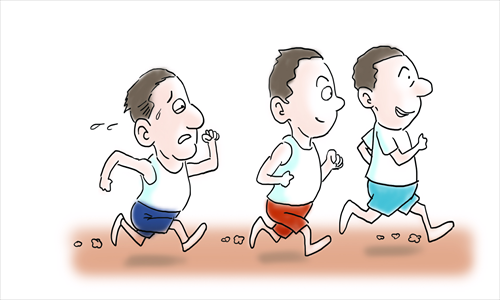Hong Kong fears falling behind mainland

Illustration: Liu Rui/GT
According to a newly released ranking by the China Institute of City Competitiveness, for three consecutive years Hong Kong has been beaten by Shanghai as the second most competitive city in China. The ranking assessed a city's competitiveness in turns of economy, society, environment and culture.
The institute warned that if Hong Kong does not innovate and adjust its policies, it would lose out to Shenzhen in integrated competitiveness. Shenzhen takes the third spot in competitiveness, and tops the ranking of cities with the biggest growth potential.
In terms of tourism, which is traditionally Hong Kong's stronghold, the report shows that the city fails to make the list of the top 30 tourist cities with unique characteristics.
The report results come as no surprise. A lack of progress in major construction, coupled with protests by radical political groups in recent years, have kidnapped Hong Kong's economic development and the city is gradually losing its competitive edge.
A recent example of delayed projects is the Guangzhou-Shenzhen-Hong Kong Express Rail Link project. While the part of the express railway between Guangzhou and Shenzhen has already been in use, construction of the part in Hong Kong has to be delayed to the end of 2018, with an extra HK$20.3 billion of construction costs.
Some radical people in Hong Kong have abused freedom of speech and protested against anything and everything, giving Hong Kong the nickname "the city of protests." This distorted culture of protests has unfortunately taken its toll on Hong Kong's tourism.
The arrival number of mainland visitors is 3.8 million in October, a decrease of 4.2 percent year on year, figures from the Hong Kong Tourism Commission shows. Following activities targeting parallel traders and mainland tourists in popular shopping sites, mainland tourists have abandoned Hong Kong as their first choice and embraced the likes of Taiwan, Japan and South Korea.
Meanwhile, other Chinese cities are catching up fast in overall competitiveness and have even surpassed Hong Kong in some areas. The establishment of the free trade zone in 2013 and the yuan's continued liberalization has reinforced Shanghai's role as China's financial center.
Today Hong Kong not only has to face tough competition from Shanghai but also its neighbor Shenzhen, especially in innovation. Shenzhen has developed from a rural city four decades ago to an innovation and logistics hub. The city is home to big telecommunications brands like Tencent and Huawei. The China Institute of City Competitiveness estimates that Shenzhen's GDP will surpass Hong Kong's very soon.
A report by the Chinese Academy of Social Sciences in May also made similar conclusions and named Shenzhen to be the most competitive city in China. The report says the biggest gap is in innovation between Hong Kong and Shenzhen.
It is ironic that in a modern city like Hong Kong, innovation is the weakest point. Hong Kong's pillar industries are too concentrated on finance, trade, logistics, professional services and tourism. Compared to the inclusiveness of Shenzhen, which has been successful in attracting technology start-ups, "(Hong Kong) have been turning away people, turning away investors, turning away ideas," Allen Ma, chief executive of Hong Kong Science Technology Parks, said in a forum in Hong Kong over the weekend.
In the World Economic Forum's global competitiveness rankings, Hong Kong's innovation ranks only at No.23 among 38 global economies. A new Innovation & Technology Bureau, established in November to promote the development of innovation in Hong Kong, can hopefully turn things around.
It is understandable that Hong Kong is experiencing more sluggish growth than its mainland counterparts, as the city had a much earlier head-start than the mainland. The problem is that it has not been doing enough to catch up.
A report by Guangzhou-based research firm Trigger Trend last year even predicted that "the territory's economic clout will be overshadowed by China's major cities by 2022."
Hong Kong still enjoys many unique advantages over other Chinese cities that won't disappear overnight, such as the rule of law, a fair business environment, well-built infrastructure and the culture of probity among civil servants. But if Hong Kong does not start to stay ahead, it is only a matter of time for it to fall behind.
The author is the deputy managing editor of Global Times Metro Shanghai. heluyi@globaltimes.com.cn